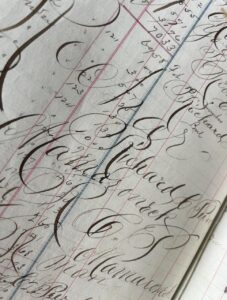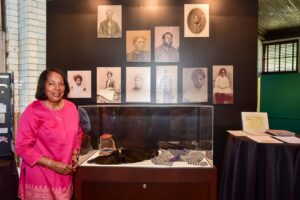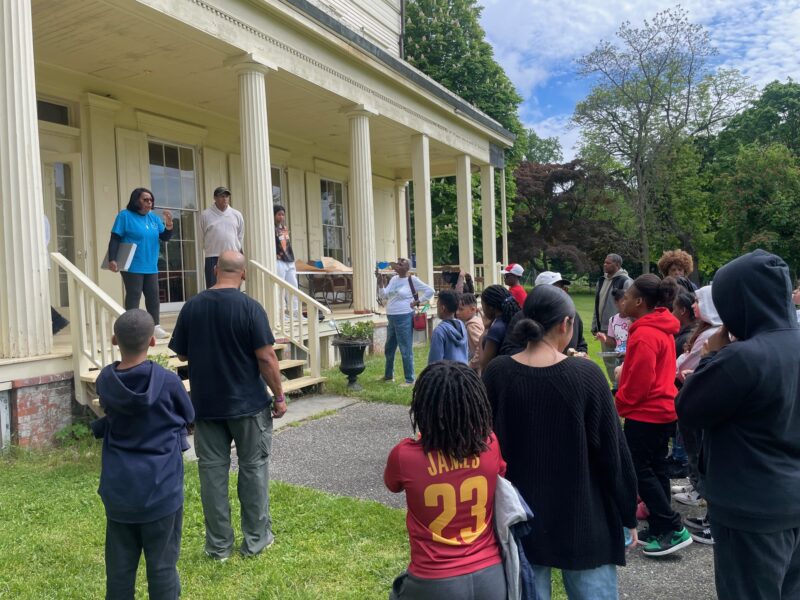 JHC is humbled to announce the magnanimous donation of an original 1873 ledger and account book belonging to the Purdy Family of Westchester. We are immensely grateful to Carol Ubosi and her family for this timely and momentous gesture. This is Carol’s second donation to JHC to support our mission of education in American history and cultural heritage – she previously donated a rare manumission document. The gift was made on Saturday, May 18th in the presence of board members of the African American Men of Westchester and students participating in an annual environmental workshop hosted at the Jay Estate. Ms. Ubosi, who is an educator and member of the Afro-American Historical and Genealogical Society in Washington, DC, spoke to the children present about her intentionality of “bringing history home” to its place of origin and the importance of knowing your past to inform your future.
JHC is humbled to announce the magnanimous donation of an original 1873 ledger and account book belonging to the Purdy Family of Westchester. We are immensely grateful to Carol Ubosi and her family for this timely and momentous gesture. This is Carol’s second donation to JHC to support our mission of education in American history and cultural heritage – she previously donated a rare manumission document. The gift was made on Saturday, May 18th in the presence of board members of the African American Men of Westchester and students participating in an annual environmental workshop hosted at the Jay Estate. Ms. Ubosi, who is an educator and member of the Afro-American Historical and Genealogical Society in Washington, DC, spoke to the children present about her intentionality of “bringing history home” to its place of origin and the importance of knowing your past to inform your future.
The ledger includes business entries and observations about 19th century life and events meticulously documented by at least three members of the Purdy family of Harrison and Mamaroneck – brothers Richard C. Purdy (1846-1886), Edward B. Purdy (1842-1894) and their mother, Harriet Seely Purdy (1812-1904). The brothers worked together as professional violinists, contractors, and builders. Harriet was the matriarch of a large family; her husband Charles Purdy (1808-1890) was a respected “owner of considerable property” in Harrison with two farms in his possession. The Purdy family are also known for their association with the African American Cemetery in Rye where they are interred. The burial ground is one of 16 sites on Westchester County’s African American Heritage Trail.

Notable events mentioned in the ledger include a first-person account of “rain like the devil” on September 23, 1882. Purdy’s calendar corroborates the deluge of more than 8 inches of rain that fell in one day in the area – the amount was further confirmed by meteorologists at the Central Park Observatory. The account book also mentions Purdy’s building stone walls at the Jay Estate for naturalist Dr. John Clarkson Jay, construction of a local school in Rye Neck and work on the Rye Ponds reservoir that contributed to today’s Kensico Water System. Handwritten entries illuminate the Purdys’ favorite pastimes like fishing, hunting, clamming and gardening and observances of Decoration Day (the precursor to Memorial Day), Independence Day (on July 5th, the date celebrated by many free Black individuals) and Election Day.
The leather-bound volume provides an intimate window into the lives, traditions, and perspectives of the Purdy family, their numerous clients and their neighbors in the Sound Shore area extending to Rye, Larchmont, New Rochelle and White Plains. The book is further testament to the vibrancy and independence of free Black business operators, individuals who voted and contributed to the economic growth and development of Westchester County. We can’t wait to digitize this ledger and share it with students who can further expand upon the compelling narratives of all the people mentioned in it. Primary documents like these are of critical importance to our research and educational programming.
Donations like these help us to heal rifts in our nation with dialogue and open conversations about social justice, hidden histories, and underrepresented voices. These powerful gifts further incentivize our commitment to interpreting the lives of all individuals who left their imprint on the Jay Estate in Rye including the Purdy family.
